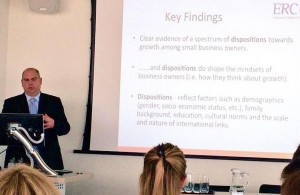The Policy Research Group’s evaluation of the 2015 Lumiere has been influential in garnering support from Durham County Council for the staging of a fifth Lumiere event in 2016.  The report, by Gordon Allinson, Paul Braidford and Maxime Houston, which was received by the County Council earlier this year shows that the event generated almost a £10m boost to the regional economy. Furthermore, as the Leader of Durham County Council, Councillor Simon Henig, stated – “More than 90 per cent of those surveyed rated Lumiere 2015 as ‘excellent’ or ‘very good’ and it said it ‘made them happy with 80 per cent of visitors saying they planned to come back.” It is hoped that the Cabinet will approve investment of £100,000 in a future Lumiere on the basis of the benefits identified in the report. See the full story online in the Northern Echo, 8th June, 2016: click here.
The report, by Gordon Allinson, Paul Braidford and Maxime Houston, which was received by the County Council earlier this year shows that the event generated almost a £10m boost to the regional economy. Furthermore, as the Leader of Durham County Council, Councillor Simon Henig, stated – “More than 90 per cent of those surveyed rated Lumiere 2015 as ‘excellent’ or ‘very good’ and it said it ‘made them happy with 80 per cent of visitors saying they planned to come back.” It is hoped that the Cabinet will approve investment of £100,000 in a future Lumiere on the basis of the benefits identified in the report. See the full story online in the Northern Echo, 8th June, 2016: click here.
Category Archives: PRG News
Arts & Culture in County Durham
 Given the ‘cooler climate’ in public funding, demonstrating the economic impact of the arts, culture and sports is more important than ever. Nationally the arts and culture sector pays its way, recent figures show an annual return of £2.35 billion to the Treasury – and the contribution to local economies is growing faster in the parts of the country worst affected by the recession like the North East. Employment in the sector is strong too, with the growth in jobs and skills feeding into an expanding knowledge and skills based economy – particularly important to young people entering the jobs market.
Given the ‘cooler climate’ in public funding, demonstrating the economic impact of the arts, culture and sports is more important than ever. Nationally the arts and culture sector pays its way, recent figures show an annual return of £2.35 billion to the Treasury – and the contribution to local economies is growing faster in the parts of the country worst affected by the recession like the North East. Employment in the sector is strong too, with the growth in jobs and skills feeding into an expanding knowledge and skills based economy – particularly important to young people entering the jobs market.
In 2015, Durham County Council commissioned PRG to develop an evaluation framework to measure the impact of the arts, cultural and sports events the Council supports. The overall aim is to establish an evaluation framework with flexible methodologies and KPIs which can be applied across all types of events and appropriate for use by different delivery organisations – large and small, public, private and third sector.
A single, standardised framework will allow meaningful comparisons, the aggregation of impacts and identification of savings; it will also produce a reliable evidence base for decision-making and strategy. And the more we understand what the sector does for us, in terms of the economy, education, health and wellbeing, and communities, the more we will be able to provide the evidence to give government and the taxpayer the confidence to invest.
During 2015 the events and festivals PRG has evaluated for County Durham have been very varied, including: Bishop Auckland Food Festival, the International Brass Festival, Durham Book Festival, culminating most recently with Lumiere Durham.
Each time we have revised and refined a range of evaluation tools, tailoring them to specific events and trying out innovative methods and approaches. For Lumiere, PRG also worked with Durham businesses to capture economic impact and help the businesses make the most of the festival’s opportunities. We also helped recruit and train more than 20 Durham University students to carry out on-street evaluation of Lumiere, helping them acquire valuable employment experience and become more involved in the life of the city.
Developing digital capability in small and medium sized businesses

Policy Research Group and BMG recently published research on Digital Capabilities in small and medium sized businesses (SMEs). The digital economy is increasingly important to the UK; that means that all UK businesses, particularly small ones, should be able to confidently use technology, and trade online in the modern interconnected world. But a lot of small businesses are not making the most of the opportunities that are open to them, and the country risks falling behind in the global marketplace.
The research found that a quarter of SMEs do not possess basic digital skills; and there is a clear, positive link between digital skill levels and growth in sales. Not only do many lack the skills, however, but there is an attitudinal barrier amongst a large minority of SMEs towards developing an online presence; a lack of awareness about the benefits and opportunities available; and a lack of understanding about online security threats.
The rollout of superfast broadband is helping things, as long as small businesses get the training ad skills they need to get the most out of it. That means delivering courses locally through existing networks, and finding out what works well – to date, there has been a lot of activity in developing digital skills but very little evaluation of the impacts in business, or which delivery methods work best.
At the sharp end of small business growth

The Policy Research Group recently presented their research on growth dispositions of small business owners at a mini-conference organised by the Department of Business Innovation and Skills at the Shard. The research, conducted in conjunction with the prestigious Enterprise Research Centre at Aston University, analyses why some owners want to grow their business while others don’t – ‘why many businesses fail to become more productive and fail to grow despite having the potential to do so’, as the research brief outlined.
A buoyant small business sector is vital to the success of the UK economy, but most small businesses never grow or, at best, achieve only modest growth. So, understanding the factors that drive and shape small business performance is a key concern for not just academics but also policymakers, helping them to devise more effective ways to overcome barriers to growth.

PRG researchers, Paul Braidford, Gordon Allinson and Maxine Houston contributed by focusing on the way in which the owners presented narratives about themselves, their backgrounds and their important life events, giving insights into the sociological reasons lying behind their attitudes and behaviours. In particular their research suggests ways to try and shape more positive attitudes towards business growth – for example, by better informing the way in which business support is targeted and delivered, or developing ‘social spaces’ to promote networking between growth-inclined owners and those who want less growth. The full report is now available here: BIS-15-482-sociology-of-enterprise
